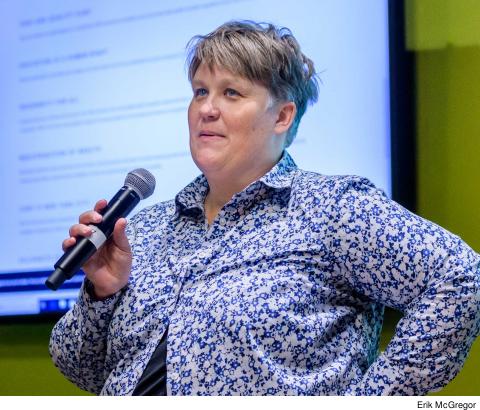Admin tried to skirt contract
 |
In the final week of the Fall semester, Hunter College administrators attempted to circumvent one of the most talked-about achievements of the newly ratified contract, the paid office hour for adjuncts. But a multi-faceted union campaign quickly put a stop to that.
Some background: throughout CUNY there are courses in English composition, computer science, mathematics and other subjects that carry more credits than classroom contact hours. For example, students earn three credits for the course, but the course meets for four hours a week, allowing for extra time for hands-on workshops, group work or instruction. Full-time faculty teaching a three-credit/four-hour course receive four workload contact hours, and adjunct faculty teaching such a course are paid for four hours a week, 60 hours a semester. English 120 and English 220 at Hunter are among these classes.
BAD NEWS
In mid-December, adjuncts in the Hunter’s English department were told that the new contractual office hour would replace the fourth contact hour, keeping their hours at 60 even though they were entitled to 75 paid hours under the new contract.
What happened next speaks to the power of the PSC to protect the contract and stand up for members’ rights. An adjunct immediately informed the PSC chapter chair at the time, Jeremy Glick, who brought the matter to the union’s leadership. The PSC quickly filed a grievance and met with campus union leaders to plan how to fight back. Glick and PSC president Barbara Bowen sent a message to chapter members. “We are actively pursuing resolution right away,” they wrote. “It’s not fair, and we will fight it.”
Meanwhile union leaders were getting ready to mount a public campaign against the plan.
REACHING OUT
Bowen contacted CUNY’s chief negotiator and reached Chancellor Félix Matos-Rodriguez on Christmas Eve. The union argued that the decision at Hunter violated both the new contract and the course descriptions for English 120 and 220 as four-contact-hour courses, approved by college governance and the State Department of Education. The new adjunct office hour was negotiated as an additional paid hour; it cannot be used to reduce existing course hours. Doing so would sabotage exactly the provision of the contract that was celebrated by the CUNY chancellor, the mayor and the governor as a major achievement: the provision of new office hours for 12,000 adjuncts during which students can meet with their instructors.
CUNY Central leadership listened. “They have a stake in the integrity of this contract, too, and they took the right position,” Bowen said. “They know we have a strong union, and I think they recognized how disastrous it would be if colleges were allowed to undermine the biggest achievement of the contract in a cynical effort to save money.” On January 2, English department instructors teaching 120 and 220 were told that they would be paid for four contact hours as well as the contractual paid office hour.
“We were happy that PSC leadership was right on top of this and responded really quickly,” said Jennifer Gaboury, the interim PSC chapter chair at Hunter. “Clearly what needs to happen is to get the word out to both administrators and department chairs about what is and what is not appropriate use of the contractual office hour and that encroachments will be taken seriously.”
Gaboury acknowledged that management’s attempt to appropriate the office hour was the result of a lack of state funding for senior colleges, which has forced college administrators to cut corners.
“The attempt to double dip in this case was in what is a kind of fiscal panic,” Gaboury said.
Bowen commented to Clarion: “The victory shows the power of collective action and immediate response to infringements of the contract. This victory shows the power of our collective action and immediate response to infringements of the contract.”
She added, “You can’t mess with the contract.”

